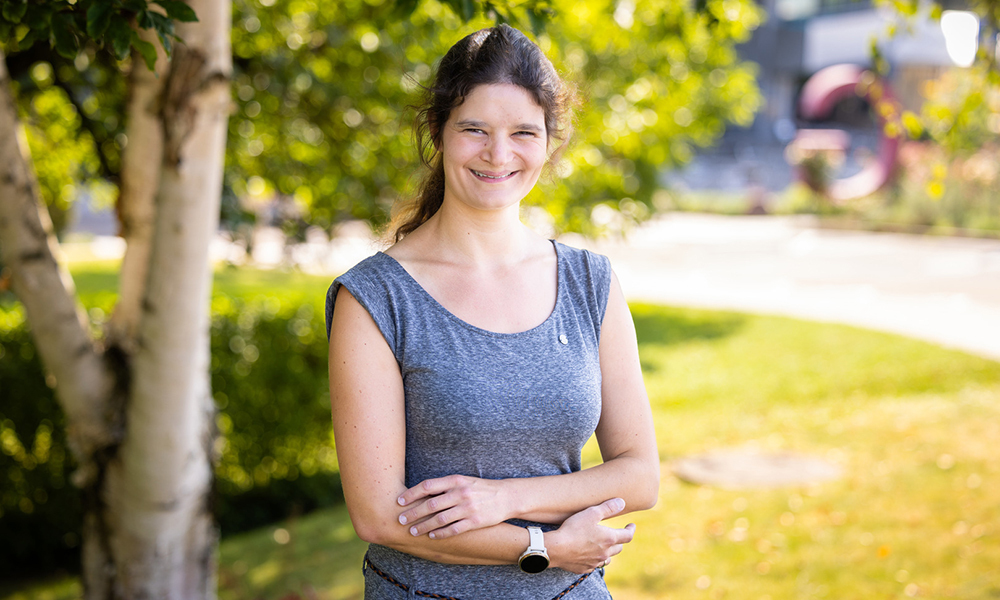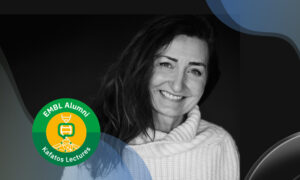
Welcome: Isabella Graf
Developmental Biology Unit’s newest group leader shares her thoughts on why theoretical biophysics is the ideal field for her, its role at EMBL, and what she looks forward to most in returning to her Mutterland

The arrival of EMBL’s newest group leader, Isabella Graf, is another indication of how the organisation is incorporating theory into its experimental research. She is the first theoretical physicist to join the Developmental Biology unit as a group leader, and she is eager for the collaborative work that lies ahead.
Graf earned her PhD at Ludwig Maximilian University of Munich and arrived at EMBL in September after postdoctoral research at Yale University in the United States.
She recently shared her thoughts and goals on the work she’ll be doing at EMBL, how her interest in underlying scientific principles led to this line of research, and her fondness for her home country’s forests.
Tell me about your research and what you hope to achieve at EMBL.
I’m generally interested in understanding how living systems can function so robustly despite the challenges they face. They are very complex and high-dimensional; all the ‘tools’ they have access to are subject to huge noise and fluctuations, and their environment is constantly changing. Using methods from statistical physics, nonlinear dynamics, and information theory, I hope to figure out whether particular design principles allow for this surprising robustness and what role phase transitions and so-called critical points, where the system’s behaviour qualitatively changes, play.
Your studies were initially in maths and physics. When did biology become part of your work and why?
Indeed, I always really enjoyed maths and physics and knew I wanted to work in theory. I’m not naturally drawn to remembering names (of people, proteins, etc.) or other details (such as people’s faces!), so I like to abstract from specifics to find unifying principles. Originally, I went into string theory. However, I soon realised I liked to share my research and excitement with friends and family and what I did was too far from reality for that to really be feasible. I hadn’t really heard about biophysics, but when I took a seminar on ‘special models and methods in statistical physics’ with my eventual master’s and PhD supervisor, I was hooked. It was so cool to see how physics can help us understand living systems but also how, by looking at such systems, we can learn new physics concepts – those that are not necessary to understand inanimate matter.
What’s the best thing about being a theoretical biophysicist?
I really enjoy two things. First, biophysics is a rather young field, so it doesn’t yet have recipes for problem-solving. As such, it is very creative work with a lot of freedom in the questions we ask and the ‘right’ approach. Second, since theorists tend to look for unifying principles that are valid in various biological contexts and on multiple scales, we are not tied to specific (model) systems but can rather easily work on a broad range of topics.
What are you looking forward to most at EMBL?
I’m really excited to meet and get to know everybody and to collaborate with the fantastic scientists here. My (limited) experience has been extremely positive. All the people I have met so far seem to be very open, collaborative, and inclusive. And, of course, it is great to have so many conferences, seminars, and talks every week. I’m looking forward to being inspired by something new every day.
You grew up in Bavaria, so what are you looking forward to learning about Heidelberg and the nearby area?
I’m looking forward to living in a very international student town, exploring the surrounding nature (e.g., Odenwald, Pfälzerwald), and being close to France (and hopefully revive some of my French).
When you are not working, where might we find you?
I enjoy all kinds of sports…swimming, climbing, biking, running/hiking, and skiing. I also like travelling to new places and playing board games with my friends and family.
In the past two years at Yale University, what have you missed most from Germany?
Apart from the obvious like my family and friends, I’ve most missed good bread and cheese, being able to bike everywhere, and good (or decent?) public transport.
What is one of your favourite books?
I really enjoyed reading An immense world by Ed Yong.
What would your lab’s theme song be?
When I asked my brother and partner for help on this question, they suggested ‘Don’t worry, be happy’ and ‘Always look on the bright side of life’, respectively. Maybe that’s a sign.


